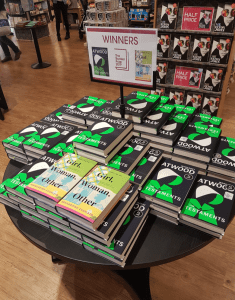It seems that 2019 is the year of disagreement and rebellion. Watching our politicians struggle to reach a decision on Brexit, should it be any wonder that the judges of the Booker Prize 2019 were lacking in unanimity, too?
Banned in 1993, the decision to award the prize to two authors only has precedents in 1973 and 1992, hence 1993’s ruling against it.
Yet this year’s judges simply refused to decide on just one winner.
This is not just controversial for the judge’s blatant disregard for the rules; no, the decision has rather marred many people’s view of the prize as half of the prize has been handed to Bernardine Evaristo, the very first black female author to win. She shares the prestigious prize with Margaret Atwood.
Evaristo, who wrote Girl, Woman, Other, a novel focusing on the lives of twelve characters (mostly women and mostly black), said she was “absolutely delighted to share [the prize] with the legend that is Margaret Atwood”.
The row deepened when it emerged that high street book shop Waterstones was receiving complaints about the availability of Evaristo’s book. Waterstones has now pledged to review its Booker Prize winner displays as customers complained about stock levels and that only Atwood’s tome, Testaments, was noted as winning.

Given Atwood’s fame, long career and significant attention, especially since her book, the Handmaid’s Tale, was televised, many felt that splitting the prize amongst the two authors was thoroughly wrong.
Many have criticised Peter Florence, the Chair of all the Booker Prize judges, for the decision, citing white supremacy and a reluctance to reward a black woman writer for her achievements.
However, in a piece for the Guardian, Booker Judge Afua Hirsch argued that choosing a winner was much like birthing a baby – except, in this case, it was twins.
“In the end”, she says, “we refused to comply” [with the 1993 ruling banning splitting the prize]. Hirsch expressed surprise at journalists, lawyers and other literary professionals were in real shock that they dared break the rules.
“You can’t compare them both”, she admits, “but you can recognise them both”.
Author Malorie Blackman was very disappointed, however, and expressed her distaste online, via Twitter. “This makes me sad.” She said, referring to the small amounts of Evaristo’s books, dwarfed next to piles of Atwood’s Testaments. “I’ve seen other bookshops display only Margaret Atwood’s book as winner of the Booker Prize. Do better”.
Splitting the prize won’t just mean splitting the award, however, it means that they share 50% of the £50,000 prize money each.
Even Atwood thought she didn’t need the attention though, standing on stage after their names were both called out, she told Evaristo, “I would have thought I would have been too elderly [as the oldest ever winner], and I kind of don’t need the attention, so I’m very glad that you’re getting some”.
On Radio 2, Evaristo noted her first as a black woman recipient of the prize and pointed out that only 4 black women have ever been shortlisted. Over the 5 days since she won, however, she’s more than doubled her lifetime sales.
Regardless of Evaristo’s success since joint-winning, perhaps it’s time someone at the Booker prize looked a little more closely at what their decision – and the record so far on black, female writers – might mean for upcoming talent of colour.

